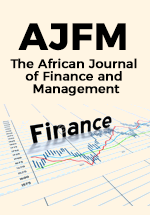The African Journal of Finance and Management (AJFM) : Volume 9, Issue 1
Ndikumana, E.
This paper attempts to discuss the impact of IT in work places generally and on employment and skills in particular. It provides, albeit briefly, an overview of the wind of change exacerbated by information technology across different countries, orga...
2000-07-01
Jairo, I.
Tanzania's current restructuring programme entails not only private ownership but also a dispersion of ownership of companies to a wider public of private entrepreneurs. This paper uses agency theory to examine the contractual relationships between v...
2000-07-01
Shitundu, J.
Luvanda, E.
The question of the effect of inflation on economic growth is one of the issues that have been hotly debated in macroeconomics. While some scholars, particularly those leaning towards the Keynes1an and Structural perspectives rend to believe that inf...
2000-07-01
Mushi, R.
The parastatal sector in Tanzania grew at a tremendous pace in the last three decades. An inventory of the sector done by the Parastatal Sector Reform Commission in the early 1990s came up with a figure of 425 firms. The large number of firms is also...
2000-07-01
Mwandenga, A.
In Tanzania and during the short run period privatization has had both positive and negative effects to the economy. The positive impact seems to outweigh the negative. Positive divestiture results can be measured by the number of firms that have bee...
2000-07-01
Ruhara, F.
The experience with financial liberalization is rather mixed. There are success stories and there are cases of failure. However financial sector liberalization school predicts improved performance if there is right sequencing of the reform programme...
2000-07-01
Chijoriga, M.
Over the years there has been an increase in the number of bank failures in both centralized and decentralized economies. Internal reasons given for bank failures include reckless lending, corrupnon, no use of prudent classification and risk assessme...
2000-07-01
Mjema, G.
The Highly Indebted Poor Costumiers (HIPC) initiative mainly by the World Bank and the International Monetary Fund has two features which distinguish it from earlier attempts to deal with the external debt problem of developing countries. First, unl...
2000-07-01

Contacts
P.O Box 3918, 5 Shaaban Robert Street
11101 Dar es salaam
+255 22 2112931-4
Fax : +255 22 2112935
rector@ifm.ac.tz
Related Links
© 2026 The Institute of Finance Management. All rights reserved.
